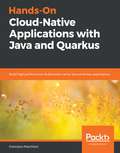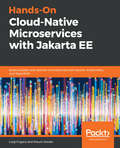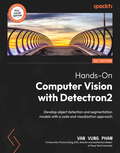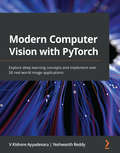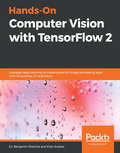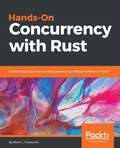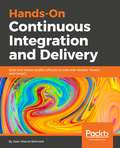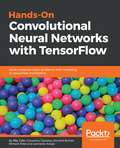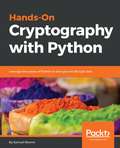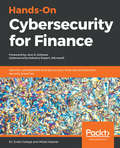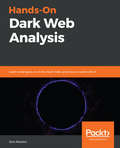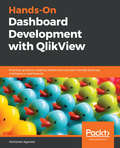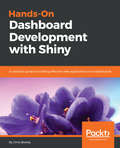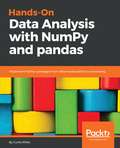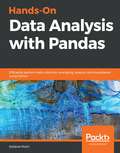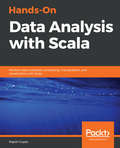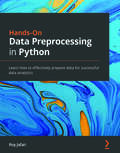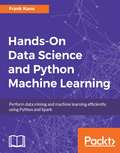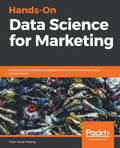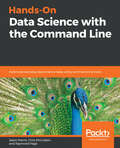- Table View
- List View
Hands-On Cloud-Native Applications with Java and Quarkus: Build high performance, Kubernetes-native Java serverless applications
by Francesco MarchioniBuild robust and reliable Java applications that works on modern infrastructure, such as containers and cloud, using the new features in Quarkus 1.0 Key Features Build apps with faster boot time and low RSS memory using the latest Quarkus 1.0 features Seamlessly integrate imperative and reactive programming models to build modern Java applications Discover effective solutions for running Java on serverless apps, microservices, containers, FaaS, and the cloud Book Description Quarkus is a new Kubernetes-native framework that allows Java developers to combine the power of containers, microservices, and cloud-native to build reliable applications. The book is a development guide that will teach you how to build Java-native applications using Quarkus and GraalVM. We start by learning about the basic concepts of a cloud-native application and its advantages over standard enterprise applications. Then we will quickly move on to application development, by installing the tooling required to build our first application on Quarkus. Next, we'll learn how to create a container-native image of our application and execute it in a Platform-as-a-Service environment such as Minishift. Later, we will build a complete real-world application that will use REST and the Contexts and Dependency injection stack with a web frontend. We will also learn how to add database persistence to our application using PostgreSQL. We will learn how to work with various APIs available to Quarkus such as Camel, Eclipse MicroProfile, and Spring DI. Towards the end, we will learn advanced development techniques such as securing applications, application configuration, and working with non-blocking programming models using Vert.x. By the end of this book, you will be proficient with all the components of Quarkus and develop-blazing fast applications leveraging modern technology infrastructure. What you will learn Build a native application using Quarkus and GraalVM Secure your applications using Elytron and the MicroProfile JWT extension Manage data persistence with Quarkus using PostgreSQL Use a non-blocking programming model with Quarkus Learn how to get Camel and Infinispan working in native mode Deploy an application in a Kubernetes-native environment using Minishift Discover Reactive Programming with Vert.x Who this book is for The book is for Java developers and software architects who are interested in learning a promising microservice architecture for building reliable and robust applications. Knowledge of Java, Spring Framework, and REST APIs is assumed.
Hands-On Cloud-Native Microservices with Jakarta EE: Build scalable and reactive microservices with Docker, Kubernetes, and OpenShift
by Luigi Fugaro Mauro VocaleDiscover how cloud-native microservice architecture helps you to build dynamically scalable applications by using the most widely used and adopted runtime environments Key Features Build robust cloud-native applications using a variety of tools Understand how to configure both Amazon Web Services (AWS) and Docker clouds for high availability Explore common design patterns used in building and deploying microservices architecture. Book Description Businesses today are evolving rapidly, and developers now face the challenge of building applications that are resilient, flexible, and native to the cloud. To achieve this, you'll need to be aware of the environment, tools, and resources that you're coding against. The book will begin by introducing you to cloud-native architecture and simplifying the major concepts. You'll learn to build microservices in Jakarta EE using MicroProfile with Thorntail and Narayana LRA. You'll then delve into cloud-native application x-rays, understanding the MicroProfile specification and the implementation/testing of microservices. As you progress further, you'll focus on continuous integration and continuous delivery, in addition to learning how to dockerize your services. You'll also cover concepts and techniques relating to security, monitoring, and troubleshooting problems that might occur with applications after you've written them. By the end of this book, you will be equipped with the skills you need to build highly resilient applications using cloud-native microservice architecture. What you will learn Integrate reactive principles in MicroProfile microservices architecture Explore the 12-factors-app paradigm and its implications Get the best out of Java versions 8 and 9 to implement a microservice based on Thorntail Understand what OpenShift is and why it is so important for an elastic architecture Build a Linux container image using Docker and scale the application using Kubernetes Implement various patterns such as, Circuit Breaker and bulkheads Get to grips with the DevOps methodology using continuous integration (CI) and continuous deployment (CD) Who this book is for This book is for developers with basic knowledge of Java EE and HTTP-based application principles who want to learn how to build, test and scale Java EE microservices. No prior experience of writing microservices in Java EE is required.
Hands-On Computer Vision with Detectron2: Develop object detection and segmentation models with a code and visualization approach
by Van Vung Pham Tommy DangExplore Detectron2 using cutting-edge models and learn all about implementing future computer vision applications in custom domainsPurchase of the print or Kindle book includes a free PDF eBookKey FeaturesLearn how to tackle common computer vision tasks in modern businesses with Detectron2Leverage Detectron2 performance tuning techniques to control the model's finest detailsDeploy Detectron2 models into production and develop Detectron2 models for mobile devicesBook DescriptionComputer vision is a crucial component of many modern businesses, including automobiles, robotics, and manufacturing, and its market is growing rapidly. This book helps you explore Detectron2, Facebook's next-gen library providing cutting-edge detection and segmentation algorithms. It's used in research and practical projects at Facebook to support computer vision tasks, and its models can be exported to TorchScript or ONNX for deployment.The book provides you with step-by-step guidance on using existing models in Detectron2 for computer vision tasks (object detection, instance segmentation, key-point detection, semantic detection, and panoptic segmentation). You'll get to grips with the theories and visualizations of Detectron2's architecture and learn how each module in Detectron2 works. As you advance, you'll build your practical skills by working on two real-life projects (preparing data, training models, fine-tuning models, and deployments) for object detection and instance segmentation tasks using Detectron2. Finally, you'll deploy Detectron2 models into production and develop Detectron2 applications for mobile devices.By the end of this deep learning book, you'll have gained sound theoretical knowledge and useful hands-on skills to help you solve advanced computer vision tasks using Detectron2.What you will learnBuild computer vision applications using existing models in Detectron2Grasp the concepts underlying Detectron2's architecture and componentsDevelop real-life projects for object detection and object segmentation using Detectron2Improve model accuracy using Detectron2's performance-tuning techniquesDeploy Detectron2 models into server environments with easeDevelop and deploy Detectron2 models into browser and mobile environmentsWho this book is forIf you are a deep learning application developer, researcher, or software developer with some prior knowledge about deep learning, this book is for you to get started and develop deep learning models for computer vision applications. Even if you are an expert in computer vision and curious about the features of Detectron2, or you would like to learn some cutting-edge deep learning design patterns, you will find this book helpful. Some HTML, Android, and C++ programming skills are advantageous if you want to deploy computer vision applications using these platforms.
Hands-On Computer Vision with Julia: Build complex applications with advanced Julia packages for image processing, neural networks, and Artificial Intelligence
by Dmitrijs CudihinsExplore the various packages in Julia that support image processing and build neural networks for video processing and object tracking.Key Features Build a full-fledged image processing application using JuliaImages Perform basic to advanced image and video stream processing with Julia's APIs Understand and optimize various features of OpenCV with easy examplesBook DescriptionHands-On Computer Vision with Julia is a thorough guide for developers who want to get started with building computer vision applications using Julia. Julia is well suited to image processing because it’s easy to use and lets you write easy-to-compile and efficient machine code..This book begins by introducing you to Julia's image processing libraries such as Images.jl and ImageCore.jl. You’ll get to grips with analyzing and transforming images using JuliaImages; some of the techniques discussed include enhancing and adjusting images. As you make your way through the chapters, you’ll learn how to classify images, cluster them, and apply neural networks to solve computer vision problems. In the concluding chapters, you will explore OpenCV applications to perform real-time computer vision analysis, for example, face detection and object tracking. You will also understand Julia's interaction with Tesseract to perform optical character recognition and build an application that brings together all the techniques we introduced previously to consolidate the concepts learned.By end of the book, you will have understood how to utilize various Julia packages and a few open source libraries such as Tesseract and OpenCV to solve computer vision problems with ease.What you will learn Analyze image metadata and identify critical data using JuliaImages Apply filters and improve image quality and color schemes Extract 2D features for image comparison using JuliaFeatures Cluster and classify images with KNN/SVM machine learning algorithms Recognize text in an image using the Tesseract library Use OpenCV to recognize specific objects or faces in images and videos Build neural network and classify images with MXNetWho this book is forHands-On Computer Vision with Julia is for Julia developers who are interested in learning how to perform image processing and want to explore the field of computer vision. Basic knowledge of Julia will help you understand the concepts more effectively.
Hands-On Computer Vision with PyTorch: Explore deep learning concepts and implement over 50 real-world image applications
by V Kishore Ayyadevara Yeshwanth ReddyThis book is for beginners to computer vision using PyTorch and intermediate-level machine learning practitioners who are looking to get well-versed with computer vision techniques using deep learning and PyTorch. Those who are just getting started with neural networks will also find this book useful. Basic knowledge of the Python programming language and machine learning is all you need to get started with this computer vision deep learning book.
Hands-On Computer Vision with TensorFlow 2: Leverage deep learning to create powerful image processing apps with TensorFlow 2.0 and Keras
by Benjamin Planche Eliot AndresA practical guide to building high performance systems for object detection, segmentation, video processing, smartphone applications, and more. This book is based on the alpha version of TensorFlow 2.Key FeaturesDiscover how to build, train, and serve your own deep neural networks with TensorFlow 2 and KerasApply modern solutions to a wide range of applications such as object detection and video analysisLearn how to run your models on mobile devices and webpages and improve their performanceBook DescriptionComputer vision solutions are becoming increasingly common, making their way in fields such as health, automobile, social media, and robotics. This book will help you explore TensorFlow 2, the brand new version of Google's open source framework for machine learning. You will understand how to benefit from using convolutional neural networks (CNNs) for visual tasks.Hands-On Computer Vision with TensorFlow 2 starts with the fundamentals of computer vision and deep learning, teaching you how to build a neural network from scratch. You will discover the features that have made TensorFlow the most widely used AI library, along with its intuitive Keras interface, and move on to building, training, and deploying CNNs efficiently. Complete with concrete code examples, the book demonstrates how to classify images with modern solutions, such as Inception and ResNet, and extract specific content using You Only Look Once (YOLO), Mask R-CNN, and U-Net. You will also build Generative Adversarial Networks (GANs) and Variational Auto-Encoders (VAEs) to create and edit images, and LSTMs to analyze videos. In the process, you will acquire advanced insights into transfer learning, data augmentation, domain adaptation, and mobile and web deployment, among other key concepts.By the end of the book, you will have both the theoretical understanding and practical skills to solve advanced computer vision problems with TensorFlow 2.0.What you will learnCreate your own neural networks from scratchClassify images with modern architectures including Inception and ResNetDetect and segment objects in images with YOLO, Mask R-CNN, and U-NetTackle problems in developing self-driving cars and facial emotion recognition systemsBoost your application’s performance with transfer learning, GANs, and domain adaptationUse recurrent neural networks for video analysisOptimize and deploy your networks on mobile devices and in the browserWho this book is forIf you’re new to deep learning and have some background in Python programming and image processing, like reading/writing image files and editing pixels, this book is for you. Even if you’re an expert curious about the new TensorFlow 2 features, you’ll find this book useful.While some theoretical explanations require knowledge in algebra and calculus, the book covers concrete examples for learners focused on practical applications such as visual recognition for self-driving cars and smartphone apps.
Hands-On Concurrency with Rust: Confidently build memory-safe, parallel, and efficient software in Rust
by Brian L. TroutwineGet to grips with modern software demands by learning the effective uses of Rust's powerful memory safety.Key Features Learn and improve the sequential performance characteristics of your software Understand the use of operating system processes in a high-scale concurrent system Learn of the various coordination methods available in the Standard library Book DescriptionMost programming languages can really complicate things, especially with regard to unsafe memory access. The burden on you, the programmer, lies across two domains: understanding the modern machine and your language's pain-points. This book will teach you to how to manage program performance on modern machines and build fast, memory-safe, and concurrent software in Rust. It starts with the fundamentals of Rust and discusses machine architecture concepts. You will be taken through ways to measure and improve the performance of Rust code systematically and how to write collections with confidence. You will learn about the Sync and Send traits applied to threads, and coordinate thread execution with locks, atomic primitives, data-parallelism, and more.The book will show you how to efficiently embed Rust in C++ code and explore the functionalities of various crates for multithreaded applications. It explores implementations in depth. You will know how a mutex works and build several yourself. You will master radically different approaches that exist in the ecosystem for structuring and managing high-scale systems. By the end of the book, you will feel comfortable with designing safe, consistent, parallel, and high-performance applications in Rust.What you will learn Probe your programs for performance and accuracy issues Create your own threading and multi-processing environment in Rust Use coarse locks from Rust’s Standard library Solve common synchronization problems or avoid synchronization using atomic programming Build lock-free/wait-free structures in Rust and understand their implementations in the crates ecosystem Leverage Rust’s memory model and type system to build safety properties into your parallel programs Understand the new features of the Rust programming language to ease the writing of parallel programsWho this book is forThis book is aimed at software engineers with a basic understanding of Rust who want to exploit the parallel and concurrent nature of modern computing environments, safely.
Hands-On Continuous Integration and Delivery: Build and release quality software at scale with Jenkins, Travis CI, and CircleCI
by Jean-Marcel BelmontUnderstand various tools and practices for building a continuous integration and delivery pipeline effectivelyKey FeaturesGet up and running with the patterns of continuous integrationLearn Jenkins UI for developing plugins and build an effective Jenkins pipelineAutomate CI/CD with command-line tools and scriptsBook DescriptionHands-On Continuous Integration and Delivery starts with the fundamentals of continuous integration (CI) and continuous delivery (CD) and where it fits in the DevOps ecosystem. You will explore the importance of stakeholder collaboration as part of CI/CD.As you make your way through the chapters, you will get to grips with Jenkins UI, and learn to install Jenkins on different platforms, add plugins, and write freestyle scripts. Next, you will gain hands-on experience of developing plugins with Jenkins UI, building the Jenkins 2.0 pipeline, and performing Docker integration. In the concluding chapters, you will install Travis CI and Circle CI and carry out scripting, logging, and debugging, helping you to acquire a broad knowledge of CI/CD with Travis CI and CircleCI.By the end of this book, you will have a detailed understanding of best practices for CI/CD systems and be able to implement them with confidence.What you will learnInstall Jenkins on multiple operating systemsWork with Jenkins freestyle scripts, pipeline syntax, and methodologyExplore Travis CI build life cycle events and multiple build languagesMaster the Travis CI CLI (command-line interface) and automate tasks with the CLIUse CircleCI CLI jobs and work with pipelinesAutomate tasks using CircleCI CLI and learn to debug and troubleshootLearn open source tooling such as Git and GitHubInstall Docker and learn concepts in shell scriptingWho this book is forHands-On Continuous Integration and Delivery is for system administrators, DevOps engineers, and build and release engineers who want to understand the concept of CI and gain hands-on experience working with prominent tools in the CI ecosystem. Basic knowledge of software delivery is an added advantage.
Hands-On Convolutional Neural Networks with TensorFlow: Solve computer vision problems with modeling in TensorFlow and Python.
by Richard Burton Iffat Zafar Giounona Tzanidou Nimesh Patel Leonardo AraujoLearn how to apply TensorFlow to a wide range of deep learning and Machine Learning problems with this practical guide on training CNNs for image classification, image recognition, object detection and many computer vision challenges.Key FeaturesLearn the fundamentals of Convolutional Neural NetworksHarness Python and Tensorflow to train CNNsBuild scalable deep learning models that can process millions of itemsBook DescriptionConvolutional Neural Networks (CNN) are one of the most popular architectures used in computer vision apps. This book is an introduction to CNNs through solving real-world problems in deep learning while teaching you their implementation in popular Python library - TensorFlow. By the end of the book, you will be training CNNs in no time!We start with an overview of popular machine learning and deep learning models, and then get you set up with a TensorFlow development environment. This environment is the basis for implementing and training deep learning models in later chapters. Then, you will use Convolutional Neural Networks to work on problems such as image classification, object detection, and semantic segmentation.After that, you will use transfer learning to see how these models can solve other deep learning problems. You will also get a taste of implementing generative models such as autoencoders and generative adversarial networks.Later on, you will see useful tips on machine learning best practices and troubleshooting. Finally, you will learn how to apply your models on large datasets of millions of images. What you will learnTrain machine learning models with TensorFlowCreate systems that can evolve and scale during their life cycleUse CNNs in image recognition and classificationUse TensorFlow for building deep learning models Train popular deep learning modelsFine-tune a neural network to improve the quality of results with transfer learningBuild TensorFlow models that can scale to large datasets and systemsWho this book is forThis book is for Software Engineers, Data Scientists, or Machine Learning practitioners who want to use CNNs for solving real-world problems. Knowledge of basic machine learning concepts, linear algebra and Python will help.
Hands-On Cryptography with Python: Leverage the power of Python to encrypt and decrypt data
by Samuel BowneLearn to evaluate and compare data encryption methods and attack cryptographic systemsKey FeaturesExplore popular and important cryptographic methodsCompare cryptographic modes and understand their limitationsLearn to perform attacks on cryptographic systemsBook DescriptionCryptography is essential for protecting sensitive information, but it is often performed inadequately or incorrectly. Hands-On Cryptography with Python starts by showing you how to encrypt and evaluate your data. The book will then walk you through various data encryption methods,such as obfuscation, hashing, and strong encryption, and will show how you can attack cryptographic systems. You will learn how to create hashes, crack them, and will understand why they are so different from each other. In the concluding chapters, you will use three NIST-recommended systems: the Advanced Encryption Standard (AES), the Secure Hash Algorithm (SHA), and the Rivest-Shamir-Adleman (RSA). By the end of this book, you will be able to deal with common errors in encryption.What you will learnProtect data with encryption and hashingExplore and compare various encryption methodsEncrypt data using the Caesar Cipher techniqueMake hashes and crack themLearn how to use three NIST-recommended systems: AES, SHA, and RSAUnderstand common errors in encryption and exploit themWho this book is forHands-On Cryptography with Python is for security professionals who want to learn to encrypt and evaluate data, and compare different encryption methods.
Hands-On Cyber Security for Finance: Identify Vulnerabilities And Secure Your Financial Services From Security Breaches
by Erdal OzkayaIf you are a security architect, cyber risk manager,or pentester looking at securing your financial organization then, this book is for you. Some basic understanding of cybersecurity tools and practices would smoothen your journey.
Hands-On Cybersecurity for Architects: Plan and design robust security architectures
by Neil Rerup Milad AslanerGain practical experience of creating security solutions and designing secure, highly available, and dynamic infrastructure for your organizationKey FeaturesArchitect complex security structures using standard practices and use casesIntegrate security with any architecture solutionImplement cybersecurity architecture in various enterprisesBook DescriptionSolutions in the IT domain have been undergoing massive changes. There was a time when bringing your own devices to work was like committing a crime. However, with an evolving IT industry comes emerging security approaches.Hands-On Cybersecurity for Architects will help you to successfully design, integrate, and implement complex security structures in any solution whilst ensuring that the solution functions as expected. To start with, you will get to grips with the fundamentals of recent cybersecurity practices, followed by acquiring and understanding your organization's requirements. You will then move on to learning how to plan and design robust security architectures, along with practical approaches to performing various security assessments. Once you have grasped all this, you will learn to design and develop key requirements, such as firewalls, virtual private networks (VPNs), wide area networks (WANs), and digital certifications. In addition to this, you will discover how to integrate upcoming security changes on Bring your own device (BYOD), cloud platforms, and the Internet of Things (IoT), among others. Finally, you will explore how to design frequent updates and upgrades for your systems as per your enterprise's needs.By the end of this book, you will be able to architect solutions with robust security components for your infrastructure.What you will learnUnderstand different security architecture layers and their integration with all solutionsStudy SWOT analysis and dig into your organization’s requirements to drive the strategyDesign and implement a secure email service approachMonitor the age and capacity of security tools and architectureExplore growth projections and architecture strategyIdentify trends, as well as what a security architect should take into considerationWho this book is forHands-On Cybersecurity for Architects is for you if you are a security, network, or system administrator interested in taking on more complex responsibilities such as designing and implementing complex security structures. Basic understanding of network and computer security implementation will be helpful. This book is also ideal for non-security architects who want to understand how to integrate security into their solutions.
Hands-On Cybersecurity with Blockchain: Implement DDoS protection, PKI-based identity, 2FA, and DNS security using Blockchain
by Rajneesh GuptaDevelop blockchain application with step-by-step instructions, working example and helpful recommendationsKey Features● Understanding the blockchain technology from the cybersecurity perspective● Developing cyber security solutions with Ethereum blockchain technology● Understanding real-world deployment of blockchain based applicationsBook DescriptionBlockchain technology is being welcomed as one of the most revolutionary and impactful innovations of today. Blockchain technology was first identified in the world’s most popular digital currency, Bitcoin, but has now changed the outlook of several organizations and empowered them to use it even for storage and transfer of value.This book will start by introducing you to the common cyberthreat landscape and common attacks such as malware, phishing, insider threats, and DDoS. The next set of chapters will help you to understand the workings of Blockchain technology, Ethereum and Hyperledger architecture and how they fit into the cybersecurity ecosystem. These chapters will also help you to write your first distributed application on Ethereum Blockchain and the Hyperledger Fabric framework. Later, you will learn about the security triad and its adaptation with Blockchain. The last set of chapters will take you through the core concepts of cybersecurity, such as DDoS protection, PKI-based identity, 2FA, and DNS security. You will learn how Blockchain plays a crucial role in transforming cybersecurity solutions.Toward the end of the book, you will also encounter some real-world deployment examples of Blockchain in security cases, and also understand the short-term challenges and future of cybersecurity with Blockchain.What you will learn● Understand the cyberthreat landscape● Learn about Ethereum and Hyperledger Blockchain● Program Blockchain solutions● Build Blockchain-based apps for 2FA, and DDoS protection● Develop Blockchain-based PKI solutions and apps for storing DNS entries● Challenges and the future of cybersecurity and BlockchainWho this book is forThe book is targeted towards security professionals, or any stakeholder dealing with cybersecurity who wants to understand the next-level of securing infrastructure using Blockchain. Basic understanding of Blockchain can be an added advantage.
Hands-On Dark Web Analysis: Learn what goes on in the Dark Web, and how to work with it
by Sion RetzkinUnderstanding the concept Dark Web and Dark Net to utilize it for effective cybersecurity Key Features Understand the concept of Dark Net and Deep Web Use Tor to extract data and maintain anonymity Develop a security framework using Deep web evidences Book Description The overall world wide web is divided into three main areas - the Surface Web, the Deep Web, and the Dark Web. The Deep Web and Dark Web are the two areas which are not accessible through standard search engines or browsers. It becomes extremely important for security professionals to have control over these areas to analyze the security of your organization. This book will initially introduce you to the concept of the Deep Web and the Dark Web and their significance in the security sector. Then we will deep dive into installing operating systems and Tor Browser for privacy, security and anonymity while accessing them. During the course of the book, we will also share some best practices which will be useful in using the tools for best effect. By the end of this book, you will have hands-on experience working with the Deep Web and the Dark Web for security analysis What you will learn Access the Deep Web and the Dark Web Learn to search and find information in the Dark Web Protect yourself while browsing the Dark Web Understand what the Deep Web and Dark Web are Learn what information you can gather, and how Who this book is for This book is targeted towards security professionals, security analyst, or any stakeholder interested in learning the concept of deep web and dark net. No prior knowledge on Deep Web and Dark Net is required
Hands-On Dashboard Development with QlikView: Practical guide to creating interactive and user-friendly business intelligence dashboards
by Abhishek AgarwalA step-by-step approach to building stunning dashboards with QlikView Key Features Perform effective storytelling through interactive dashboards built with QlikView Create different types of visualizations from a variety of data sources Includes tips, tricks, and best practices to perform effective Business Intelligence using QlikView Book Description QlikView is one of the market leaders when it comes to building effective Business Intelligence solutions. This book will show how you can leverage its power to build your own dashboards to tell your own data story. The book starts with showing you how to connect your data to QlikView and create your own QlikView application. You will learn how to add data from multiple sources, create a data model by joining data, and then review it on the front end. You will work with QlikView components such as charts, list boxes, input boxes, and text objects to create stunning visualizations that help give actionable business insights. You will also learn how to perform analysis on your data in QlikView and master the various types of security measures to be taken in QlikView. By the end of this book, you will have all the essential knowledge required for insightful data storytelling and creating useful BI dashboards using QlikView. What you will learn Learn to use the latest and newest features of QlikView Connect QlikView to various data sources, such as databases and websites Create a fully featured data model without circular references Display your data in maps, charts, and text across multiple sheets Apply set analysis to your data in QlikView expressions Secure your data based on the various audience types Who this book is for This book is best suited for BI professionals, data analysts and budding QlikView developers who wish to build effective dashboards using QlikView. Some basic understanding of the data visualization concepts and Business Intelligence is required.
Hands-On Dashboard Development with Shiny: A practical guide to building effective web applications and dashboards
by Chris BeeleyProgressively explore UI development with Shiny via practical examplesKey FeaturesWrite a Shiny interface in pure HTMLExplore powerful layout functions to make attractive dashboards and other intuitive interfacesGet to grips with Bootstrap and leverage it in your Shiny applicationsBook DescriptionAlthough vanilla Shiny applications look attractive with some layout flexibility, you may still want to have more control over how the interface is laid out to produce a dashboard. Hands-On Dashboard Development with Shiny helps you incorporate this in your applications.The book starts by guiding you in producing an application based on the diamonds dataset included in the ggplot2 package. You’ll create a single application, but the interface will be reskinned and rebuilt throughout using different methods to illustrate their uses and functions using HTML, CSS, and JavaScript. You will also learn to develop an application that creates documents and reports using R Markdown. Furthermore, the book demonstrates the use of HTML templates and the Bootstrap framework. Moving along, you will learn how to produce dashboards using the Shiny command and dashboard package. Finally, you will learn how to lay out applications using a wide range of built-in functions.By the end of the book, you will have an understanding of the principles that underpin layout in Shiny applications, including sections of HTML added to a vanilla Shiny application, HTML interfaces written from scratch, dashboards, navigation bars, and interfaces.What you will learnAdd HTML to a Shiny application and write its interfaces from scratch in HTMLUse built-in Shiny functions to produce attractive and flexible layoutsProduce dashboards, adding icons and notificationsExplore Bootstrap themes to lay out your applicationsGet insights into UI development with hands-on examplesUse R Markdown to create and download reportsWho this book is forIf you have some experience writing Shiny applications and want to use HTML, CSS, and Bootstrap to make custom interfaces, then this book is for you.
Hands-On Data Analysis with NumPy and pandas: Implement Python packages from data manipulation to processing
by Curtis MillerGet to grips with the most popular Python packages that make data analysis possibleKey FeaturesExplore the tools you need to become a data analystDiscover practical examples to help you grasp data processing conceptsWalk through hierarchical indexing and grouping for data analysisBook DescriptionPython, a multi-paradigm programming language, has become the language of choice for data scientists for visualization, data analysis, and machine learning.Hands-On Data Analysis with NumPy and Pandas starts by guiding you in setting up the right environment for data analysis with Python, along with helping you install the correct Python distribution. In addition to this, you will work with the Jupyter notebook and set up a database. Once you have covered Jupyter, you will dig deep into Python’s NumPy package, a powerful extension with advanced mathematical functions. You will then move on to creating NumPy arrays and employing different array methods and functions. You will explore Python’s pandas extension which will help you get to grips with data mining and learn to subset your data. Last but not the least you will grasp how to manage your datasets by sorting and ranking them. By the end of this book, you will have learned to index and group your data for sophisticated data analysis and manipulation.What you will learnUnderstand how to install and manage AnacondaRead, sort, and map data using NumPy and pandasFind out how to create and slice data arrays using NumPyDiscover how to subset your DataFrames using pandasHandle missing data in a pandas DataFrameExplore hierarchical indexing and plotting with pandasWho this book is forHands-On Data Analysis with NumPy and Pandas is for you if you are a Python developer and want to take your first steps into the world of data analysis. No previous experience of data analysis is required to enjoy this book.
Hands-On Data Analysis with Pandas - Second Edition
by Stefanie MolinThis book is for data science beginners, data analysts, and Python developers who want to explore each stage of data analysis and scientific computing using a wide range of datasets. You’ll also find this book useful if you are a data scientist looking to implement pandas in machine learning. Working knowledge of Python programming language will assist with understanding the key concepts covered in this book.
Hands-On Data Analysis with Pandas: Efficiently perform data collection, wrangling, analysis, and visualization using Python
by Stefanie MolinGet to grips with pandas—a versatile and high-performance Python library for data manipulation, analysis, and discovery Key Features Perform efficient data analysis and manipulation tasks using pandas Apply pandas to different real-world domains using step-by-step demonstrations Get accustomed to using pandas as an effective data exploration tool Book Description Data analysis has become a necessary skill in a variety of positions where knowing how to work with data and extract insights can generate significant value. Hands-On Data Analysis with Pandas will show you how to analyze your data, get started with machine learning, and work effectively with Python libraries often used for data science, such as pandas, NumPy, matplotlib, seaborn, and scikit-learn. Using real-world datasets, you will learn how to use the powerful pandas library to perform data wrangling to reshape, clean, and aggregate your data. Then, you will learn how to conduct exploratory data analysis by calculating summary statistics and visualizing the data to find patterns. In the concluding chapters, you will explore some applications of anomaly detection, regression, clustering, and classification, using scikit-learn, to make predictions based on past data. By the end of this book, you will be equipped with the skills you need to use pandas to ensure the veracity of your data, visualize it for effective decision-making, and reliably reproduce analyses across multiple datasets. What you will learn Understand how data analysts and scientists gather and analyze data Perform data analysis and data wrangling in Python Combine, group, and aggregate data from multiple sources Create data visualizations with pandas, matplotlib, and seaborn Apply machine learning (ML) algorithms to identify patterns and make predictions Use Python data science libraries to analyze real-world datasets Use pandas to solve common data representation and analysis problems Build Python scripts, modules, and packages for reusable analysis code Who this book is for This book is for data analysts, data science beginners, and Python developers who want to explore each stage of data analysis and scientific computing using a wide range of datasets. You will also find this book useful if you are a data scientist who is looking to implement pandas in machine learning. Working knowledge of Python programming language will be beneficial.
Hands-On Data Analysis with Scala: Perform data collection, processing, manipulation, and visualization with Scala
by Rajesh GuptaMaster scala's advanced techniques to solve real-world problems in data analysis and gain valuable insights from your dataKey FeaturesA beginner's guide for performing data analysis loaded with numerous rich, practical examplesAccess to popular Scala libraries such as Breeze, Saddle for efficient data manipulation and exploratory analysisDevelop applications in Scala for real-time analysis and machine learning in Apache SparkBook DescriptionEfficient business decisions with an accurate sense of business data helps in delivering better performance across products and services. This book helps you to leverage the popular Scala libraries and tools for performing core data analysis tasks with ease.The book begins with a quick overview of the building blocks of a standard data analysis process. You will learn to perform basic tasks like Extraction, Staging, Validation, Cleaning, and Shaping of datasets. You will later deep dive into the data exploration and visualization areas of the data analysis life cycle. You will make use of popular Scala libraries like Saddle, Breeze, Vegas, and PredictionIO for processing your datasets. You will learn statistical methods for deriving meaningful insights from data. You will also learn to create applications for Apache Spark 2.x on complex data analysis, in real-time. You will discover traditional machine learning techniques for doing data analysis. Furthermore, you will also be introduced to neural networks and deep learning from a data analysis standpoint.By the end of this book, you will be capable of handling large sets of structured and unstructured data, perform exploratory analysis, and building efficient Scala applications for discovering and delivering insightsWhat you will learnTechniques to determine the validity and confidence level of dataApply quartiles and n-tiles to datasets to see how data is distributed into many bucketsCreate data pipelines that combine multiple data lifecycle stepsUse built-in features to gain a deeper understanding of the dataApply Lasso regression analysis method to your dataCompare Apache Spark API with traditional Apache Spark data analysisWho this book is forIf you are a data scientist or a data analyst who wants to learn how to perform data analysis using Scala, this book is for you. All you need is knowledge of the basic fundamentals of Scala programming.
Hands-On Data Preprocessing in Python: Learn how to effectively prepare data for successful data analytics
by Roy JafariThis book will make the link between data cleaning and preprocessing to help you design effective data analytic solutionsKey FeaturesDevelop the skills to perform data cleaning, data integration, data reduction, and data transformationGet ready to make the most of your data with powerful data transformation and massaging techniquesPerform thorough data cleaning, such as dealing with missing values and outliersBook DescriptionData preprocessing is the first step in data visualization, data analytics, and machine learning, where data is prepared for analytics functions to get the best possible insights. Around 90% of the time spent on data analytics, data visualization, and machine learning projects is dedicated to performing data preprocessing.This book will equip you with the optimum data preprocessing techniques from multiple perspectives. You'll learn about different technical and analytical aspects of data preprocessing – data collection, data cleaning, data integration, data reduction, and data transformation – and get to grips with implementing them using the open source Python programming environment. This book will provide a comprehensive articulation of data preprocessing, its whys and hows, and help you identify opportunities where data analytics could lead to more effective decision making. It also demonstrates the role of data management systems and technologies for effective analytics and how to use APIs to pull data.By the end of this Python data preprocessing book, you'll be able to use Python to read, manipulate, and analyze data; perform data cleaning, integration, reduction, and transformation techniques; and handle outliers or missing values to effectively prepare data for analytic tools.What you will learnUse Python to perform analytics functions on your dataUnderstand the role of databases and how to effectively pull data from databasesPerform data preprocessing steps defined by your analytics goalsRecognize and resolve data integration challengesIdentify the need for data reduction and execute itDetect opportunities to improve analytics with data transformationWho this book is forJunior and senior data analysts, business intelligence professionals, engineering undergraduates, and data enthusiasts looking to perform preprocessing and data cleaning on large amounts of data will find this book useful. Basic programming skills, such as working with variables, conditionals, and loops, along with beginner-level knowledge of Python and simple analytics experience, are assumed.
Hands-On Data Science and Python Machine Learning
by Frank KaneThis book covers the fundamentals of machine learning with Python in a concise and dynamic manner. It covers data mining and large-scale machine learning using Apache Spark. About This Book • Take your first steps in the world of data science by understanding the tools and techniques of data analysis • Train efficient Machine Learning models in Python using the supervised and unsupervised learning methods • Learn how to use Apache Spark for processing Big Data efficiently Who This Book Is For If you are a budding data scientist or a data analyst who wants to analyze and gain actionable insights from data using Python, this book is for you. Programmers with some experience in Python who want to enter the lucrative world of Data Science will also find this book to be very useful, but you don't need to be an expert Python coder or mathematician to get the most from this book. What You Will Learn • Learn how to clean your data and ready it for analysis • Implement the popular clustering and regression methods in Python • Train efficient machine learning models using decision trees and random forests • Visualize the results of your analysis using Python's Matplotlib library • Use Apache Spark's MLlib package to perform machine learning on large datasets In Detail Join Frank Kane, who worked on Amazon and IMDb's machine learning algorithms, as he guides you on your first steps into the world of data science. Hands-On Data Science and Python Machine Learning gives you the tools that you need to understand and explore the core topics in the field, and the confidence and practice to build and analyze your own machine learning models. With the help of interesting and easy-to-follow practical examples, Frank Kane explains potentially complex topics such as Bayesian methods and K-means clustering in a way that anybody can understand them. Based on Frank's successful data science course, Hands-On Data Science and Python Machine Learning empowers you to conduct data analysis and perform efficient machine learning using Python. Let Frank help you unearth the value in your data using the various data mining and data analysis techniques available in Python, and to develop efficient predictive models to predict future results. You will also learn how to perform large-scale machine learning on Big Data using Apache Spark. The book covers preparing your data for analysis, training machine learning models, and visualizing the final data analysis. Style and approach This comprehensive book is a perfect blend of theory and hands-on code examples in Python which can be used for your reference at any time.
Hands-On Data Science for Marketing: Improve your marketing strategies with machine learning using Python and R
by Yoon Hyup HwangOptimize your marketing strategies through analytics and machine learning Key Features Understand how data science drives successful marketing campaigns Use machine learning for better customer engagement, retention, and product recommendations Extract insights from your data to optimize marketing strategies and increase profitability Book Description Regardless of company size, the adoption of data science and machine learning for marketing has been rising in the industry. With this book, you will learn to implement data science techniques to understand the drivers behind the successes and failures of marketing campaigns. This book is a comprehensive guide to help you understand and predict customer behaviors and create more effectively targeted and personalized marketing strategies. This is a practical guide to performing simple-to-advanced tasks, to extract hidden insights from the data and use them to make smart business decisions. You will understand what drives sales and increases customer engagements for your products. You will learn to implement machine learning to forecast which customers are more likely to engage with the products and have high lifetime value. This book will also show you how to use machine learning techniques to understand different customer segments and recommend the right products for each customer. Apart from learning to gain insights into consumer behavior using exploratory analysis, you will also learn the concept of A/B testing and implement it using Python and R. By the end of this book, you will be experienced enough with various data science and machine learning techniques to run and manage successful marketing campaigns for your business. What you will learn Learn how to compute and visualize marketing KPIs in Python and R Master what drives successful marketing campaigns with data science Use machine learning to predict customer engagement and lifetime value Make product recommendations that customers are most likely to buy Learn how to use A/B testing for better marketing decision making Implement machine learning to understand different customer segments Who this book is for If you are a marketing professional, data scientist, engineer, or a student keen to learn how to apply data science to marketing, this book is what you need! It will be beneficial to have some basic knowledge of either Python or R to work through the examples. This book will also be beneficial for beginners as it covers basic-to-advanced data science concepts and applications in marketing with real-life examples.
Hands-On Data Science with Anaconda: Utilize the right mix of tools to create high-performance data science applications
by Yuxing Yan James YanDevelop, deploy, and streamline your data science projects with the most popular end-to-end platform, AnacondaKey Features-Use Anaconda to find solutions for clustering, classification, and linear regression-Analyze your data efficiently with the most powerful data science stack-Use the Anaconda cloud to store, share, and discover projects and librariesBook DescriptionAnaconda is an open source platform that brings together the best tools for data science professionals with more than 100 popular packages supporting Python, Scala, and R languages. Hands-On Data Science with Anaconda gets you started with Anaconda and demonstrates how you can use it to perform data science operations in the real world.The book begins with setting up the environment for Anaconda platform in order to make it accessible for tools and frameworks such as Jupyter, pandas, matplotlib, Python, R, Julia, and more. You’ll walk through package manager Conda, through which you can automatically manage all packages including cross-language dependencies, and work across Linux, macOS, and Windows. You’ll explore all the essentials of data science and linear algebra to perform data science tasks using packages such as SciPy, contrastive, scikit-learn, Rattle, and Rmixmod. Once you’re accustomed to all this, you’ll start with operations in data science such as cleaning, sorting, and data classification. You’ll move on to learning how to perform tasks such as clustering, regression, prediction, and building machine learning models and optimizing them. In addition to this, you’ll learn how to visualize data using the packages available for Julia, Python, and R.What you will learnPerform cleaning, sorting, classification, clustering, regression, and dataset modeling using AnacondaUse the package manager conda and discover, install, and use functionally efficient and scalable packagesGet comfortable with heterogeneous data exploration using multiple languages within a projectPerform distributed computing and use Anaconda Accelerate to optimize computational powersDiscover and share packages, notebooks, and environments, and use shared project drives on Anaconda CloudTackle advanced data prediction problemsWho this book is forHands-On Data Science with Anaconda is for you if you are a developer who is looking for the best tools in the market to perform data science. It’s also ideal for data analysts and data science professionals who want to improve the efficiency of their data science applications by using the best libraries in multiple languages. Basic programming knowledge with R or Python and introductory knowledge of linear algebra is expected.
Hands-On Data Science with Command Line: Automate everyday data science tasks using command-line tools
by Jason Morris Chris McCubbinThis book is for data scientists and data analysts with little to no knowledge of the command line but has an understanding of data science. Perform everyday data science tasks using the power of command line tools.
